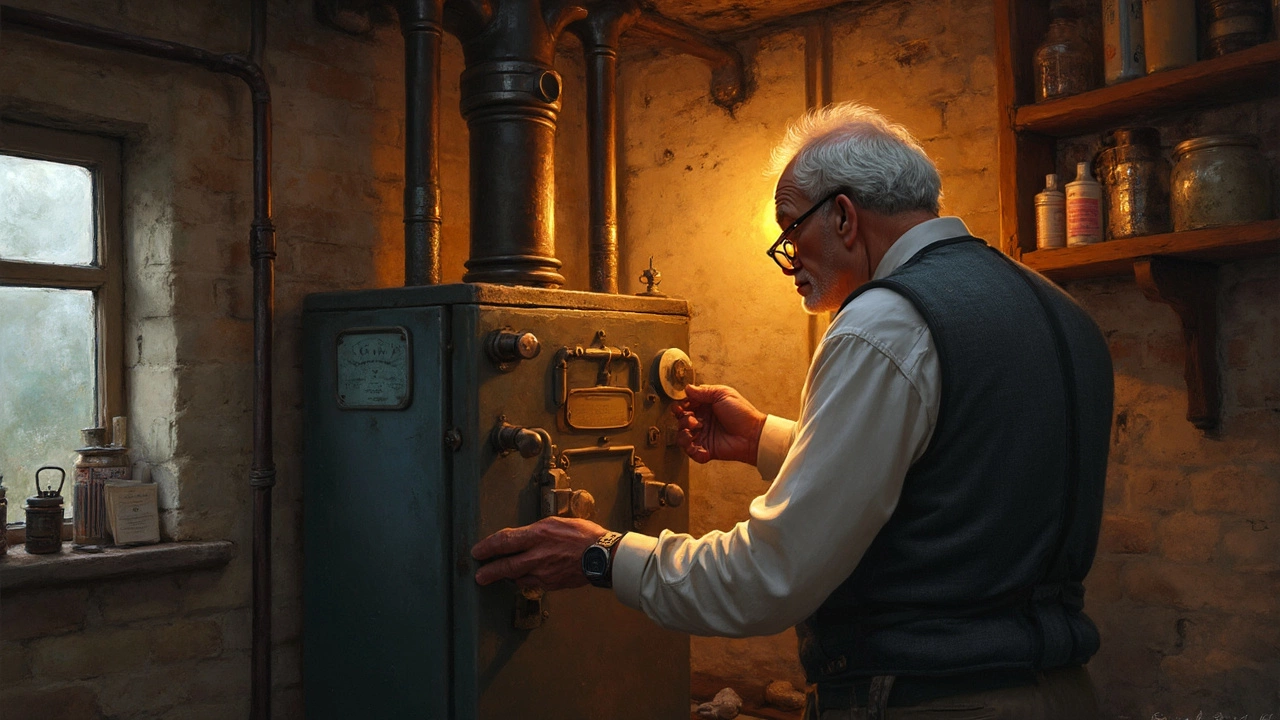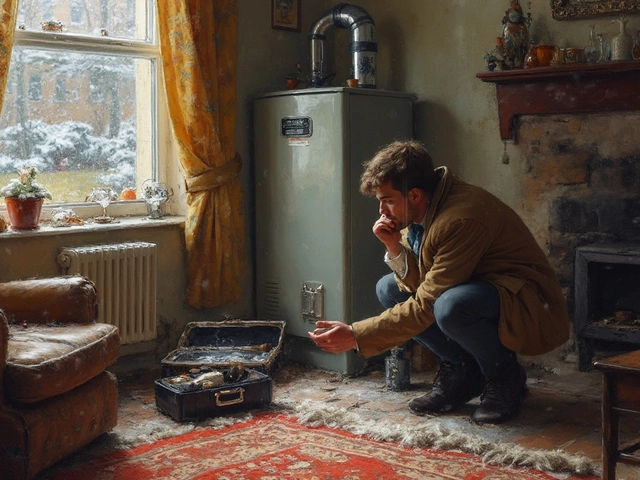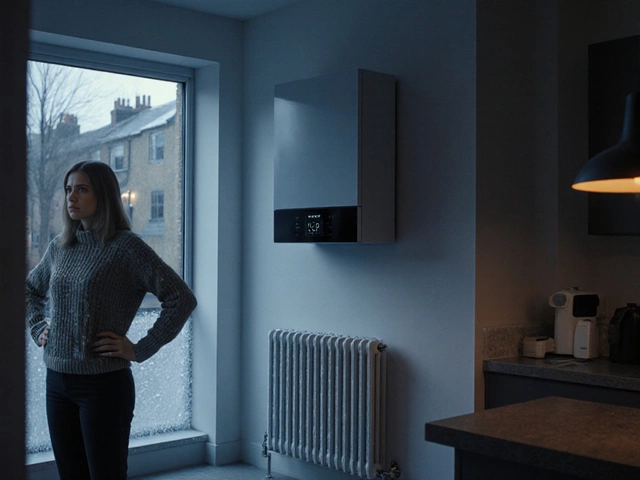Wondering how long your boiler is going to stick around? Most boilers, if treated kindly, have a solid lifespan of about 10 to 15 years. But that's not a hard rule. Some well-maintained models can even last up to 20 years. So, what's the secret sauce to a long-lasting boiler? It's all about understanding what affects their lifespan and how you can keep them running smoothly.
One key factor is maintenance. Boilers are like cars—they need regular check-ups to ensure everything's in tip-top shape. An annual service can catch minor issues before they turn into costly repairs. But remember, how you use it matters too. Cranking it up all the time or ignoring small problems can shorten its life.
Ever heard a boiler make strange noises or seen leaks around its base? Those are not-so-subtle hints that it might be time for a replacement. But don't panic! With the right information, you can decide when it's really time to say goodbye and invest in a new one. Besides, knowing when to bring in a pro can save you a lot of headaches down the line.
- Average Lifespan of a Boiler
- Factors Affecting Boiler Lifespan
- Signs Your Boiler Needs Replacement
- Maintenance Tips for Longer Boiler Life
- Choosing the Right Boiler for Your Home
- When to Consult a Professional
Average Lifespan of a Boiler
Let’s just say, the lifespan of a boiler is a bit of a hot topic in the world of home appliances. On average, most boilers can keep chugging along for around 10 to 15 years. However, this isn't a hard-and-fast rule. Some tough-seeming boilers with regular tender loving care might surprise you and last even longer.
Now, where does durability come into play? Well, boiler lifespan hinges on several factors, such as the type of boiler and its quality. Top-tier brands, unsurprisingly, may push that average lifespan as high as the 20-year mark. Generally, condensing boilers, with their fancy heat exchange tech, are built to last longer compared to non-condensing ones. But, it’s vital to note, this efficiency is only possible with regular boiler maintenance.
It’s not all about the fancy brands and types. How you treat your boiler day in and day out plays a big role in its longevity. High use in harsh seasons, or neglecting basic maintenance, like bleeding radiators and checking pressure, can cause parts to wear out faster.
Factors Influencing Lifespan
- Usage Frequency: Boilers that are constantly in use might face wear and tear quicker.
- Water Quality: Hard water can increase scaling and reduce efficiency.
- Installation Quality: A poor install can shave years off its life.
Want to keep track of your boiler’s age just like you do with anniversaries and birthdays? It might be useful to note down its installation date and schedule regular check-ups. If you hang onto that paperwork, it can give you insights into how many years your boiler has left to keep your baths warm and your heating toasty.
Factors Affecting Boiler Lifespan
The lifespan of a boiler isn't just a guessing game. Various factors come into play, deciding whether it will be a short-lived appliance or a long-haul champion. Let's break down the common things that can influence how long your boiler stays in action.
Quality of Installation
This might be the single most crucial factor affecting your boiler's longevity. Proper installation ensures everything is set up to run efficiently from the get-go. A poor installation job can lead to frequent breakdowns, reducing the boiler lifespan significantly.
Regular Maintenance
Think of maintenance as a health check-up for your boiler. Regularly scheduled servicing can prevent potential issues from becoming serious problems. It's the best way to keep your boiler running efficiently and extend its life. Missing out on this can lead to bigger repair bills or even early replacement.
Water Quality
Believe it or not, the quality of water flowing through your boiler affects its lifespan. Hard water, loaded with minerals, can lead to limescale build-up, which is bad news for your boiler's components. Installing a water softener can help mitigate this problem.
Frequency of Use
How often you run your heating system can impact your boiler lifespan. If you're cranking up the heat around the clock, that's a lot of wear and tear. It's like running a marathon every day—things are going to wear out faster.
Type of Boiler
Different boilers come with different lifespans. Condensing boilers, for instance, are more efficient but can be more sensitive to specific issues that might shorten their life. Knowing what you're working with can help you plan better care and maintenance.
| Boiler Type | Average Lifespan (Years) |
|---|---|
| Standard | 10-15 |
| Condensing | 15-20 |
| Combi | 10-15 |
Considering these factors can really make the difference between a boiler that gives up early and one that sticks around for the long run. Keep an eye on them, and chat with a pro if you're unsure about your boiler's specific needs.
Signs Your Boiler Needs Replacement
How do you know when it's time to give your boiler the boot? There are some telltale signs that your trusty old boiler might be nearing the end of its lifespan.
Frequent Breakdowns
If your boiler seems to call it quits every winter, you're probably throwing money down the drain. Frequent repairs are a big red flag that you should consider getting a new one. Let's face it, no one wants surprise breakdowns when it's freezing outside.
Rising Energy Bills
Notice your energy bills creeping up? It could be your boiler. As they age, boilers become less efficient, guzzling more gas or electricity to do the same job. A newer, more efficient model could slash those bills down by nearly 20%.
Strange Noises
Kettling, banging, or whistling sounds might sound like your boiler's auditioning for a choir, but it's actually a sign of trouble. Such noises mean there's a buildup of limescale or sludge, causing the boiler to overheat and potentially get damaged.
Leaking
A leak is never a good sign. It can cause considerable damage if hidden away in a closet or basement. Plus, it indicates internal parts might be wearing out and potentially mean your boiler's on its last legs.
Radiators Not Getting Hot
If you’re freezing in one room while another is toasty, that's a classic sign your boiler's struggling. Inconsistent heating is usually a sign of an inefficient or failing system.
Replacing your boiler isn't a decision to be taken lightly, but if it's showing these signs, it's probably time to start thinking about a new, more efficient model. Consult a professional to help you decide the best time to replace your boiler.

Maintenance Tips for Longer Boiler Life
Boosting the life of your boiler isn't rocket science, but it does require a bit of attention. Think of it like keeping your trusty car in shape—regular boiler maintenance makes all the difference.
Regularly Service Your Boiler
Setting up a yearly service with a professional is like a health check for your boiler. They can spot what you might miss, like corrosion or potential leaks. During these check-ups, any worn parts can be swapped out, ensuring your boiler stays efficient.
Bleed Your Radiators
Ever noticed cold spots on your radiators? That's trapped air preventing the heat from spreading evenly. Bleeding them is a quick fix. Just pop open the valve with a radiator key and let the air hiss out. Once water starts dribbling, close it up, and you'll feel the room warming in no time.
Check the Pressure
Your boiler's pressure matters—a lot. Too high or too low can cause it to malfunction. A quick glance at the pressure gauge should read between 1 and 1.5 bars. If not, it might be time to adjust the levels, following the manual's instructions.
Keep an Eye on the Flame
A healthy flame is blue. If yours is yellow or orange, it could mean trouble. This could point to a variety of issues, from blocked vents to incorrect gas mixtures. So, if you spot a weird flame, better call in a professional.
Insulate Your Pipes
Ever thought about insulating your boiler's pipes? It’s a nifty trick to prevent them from freezing in winter. Foam pipe lagging is your friend here—cheap and easy to fit.
Stay Clear of Clutter
The area around your boiler should be clutter-free. Piling stuff up nearby not only blocks necessary airflow but can also be a fire risk. Give your boiler space to breathe easily.
| Year | Boilers Replaced | Average Lifespan (years) |
|---|---|---|
| 2023 | 1,200,000 | 13 |
| 2024 | 1,100,000 | 12.5 |
Keeping these pointers in mind can add years to your boiler's life and keep your home comfy. The key is to be proactive with your boiler repair strategy and not wait until something's wrong. Your wallet will thank you, and so will your warm, cozy home.
Choosing the Right Boiler for Your Home
Picking out a new boiler can feel a bit overwhelming, especially with all the different types buzzing around. But don't worry, we'll break it down for you. First off, there are mainly three types of boilers to consider: combi, system, and conventional.
Combi Boilers
A combi boiler is a popular choice because of its compact size. It's perfect if you're looking to save on space since it doesn’t need a separate hot water cylinder or cold water tank. They're efficient and great for homes where you don’t use a lot of hot water at the same time. One downside? They might struggle in homes with many bathrooms.
System Boilers
If you’ve got a bigger family or home, a system boiler could be more your speed. Like a combi, they're compact but come with an added bonus: a separate hot water cylinder. This means they can handle more than one tap being used at the same time, which is ideal for folks who can't wait to get their hands on hot water in the mornings.
Conventional Boilers
Then, there’s the traditional conventional boiler, also known as a regular boiler. It’s got both a hot water cylinder and a cold-water storage tank. These are great for older homes that already have a traditional heating set-up. Keep in mind, though, they take up more space.
When choosing a boiler, size matters, and I’m not just talking about the physical size. The capacity needs to suit your daily demands. This is crucial for maintaining efficiency and keeping energy bills in check. You'll want to think about how many bathrooms you have, how often you run hot water, and of course, your budget.
To sum it up, the best boiler for you will depend on your home’s specific needs. And once you’ve got the right one installed, you’ll be on your way to a cozy and efficient household. If you're ever in doubt, don’t hesitate to seek advice from a professional before making a decision.
When to Consult a Professional
Knowing when to call in a boiler repair pro can save you from more significant headaches down the road. But how do you know when it's time to make that call?
Strange Noises or Odors
If your boiler starts to produce odd noises—like banging, clunking, or whooshing—or unpleasant smells, it could mean there are internal issues brewing. Secure a professional evaluation before it spirals into something more severe.
Uneven Heating
Is your house feeling like a freezer in some spots and a sauna in others? Uneven heating is often a sign something is up with your boiler. Instead of cranking up the heat and hiking up your bills, have an expert take a look.
Frequent System Shutdowns
Does your boiler keep turning itself off? This can be due to a myriad of reasons—ranging from thermostat issues to low pressure. Whatever the cause, a professional can pinpoint and fix it.
Leaking Water
A little condensation is one thing, but visible leaks are another. Leaks can lead to significant water damage if ignored, so it's crucial to get a professional involved stat.
Annual Maintenance
Even if all seems well, annual checks by a professional are vital to prolonging your boiler’s life. These checks can spot worn-out parts or efficiency issues before they become big problems.
| Situation | When to Call |
|---|---|
| Noises or Smells | Immediately |
| Uneven Heating | If persistent |
| Frequent Shutdowns | More than once |
| Leaking Water | Immediately |
While some minor tweaks can be DIY, serious symptoms need a professional touch to prevent long-term damage and ensure safety. Your boiler's longevity and efficiency depend on it!




